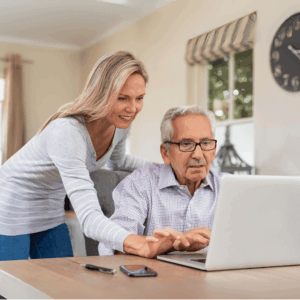Security online is an important part of protecting your assets. At Home Care Assistance we know that seniors can be vulnerable to scams on the internet. Last month we did the first of our two part blog series on staying safe on the internet. This month we are looking at staying safe using social media and advanced security tips. We recommend discussing these tips as a family so support can be provided where necessary.
Online Safety Tips
For those looking to enhance their online safety, consider implementing these tips:
- Two-Factor Authentication (2FA). Two-factor authentication adds an extra layer of security to your online accounts. In addition to your password, 2FA requires a second verification form, such as a code sent to your phone or an authentication app. Enable 2FA on all your important accounts, such as email, banking, and social media. If you are unsure how to set this up or use it, ask a family member to help you.
- Installing and Updating Security Software. Keep your computer and devices secure by installing and maintaining up-to-date antivirus and anti-malware software that detects and removes threats before they cause harm. These can be set to run automatically, so once these automations are in place, you do not have to worry about remembering to do them.
- Safe Online Shopping. When shopping online, stick to reputable brands that have online shopping. Do not use a website if you are unsure if it is legitimate. Ensure the website is secure by looking for “https://” in the URL and a padlock symbol in the address bar. These indicate that the site is using encryption to protect your information. Use credit cards or secure payment methods like PayPal, which offer more protection than debit cards. If you think a site may not be legitimate, stop and go through a different site or ask a family member to check the site out for you.
- It is often possible to set up any banking apps on your phone to alert you if any transactions go through. This lets you act quickly if an unauthorised transaction is on your account. It also alleviates the need to remember to check bank statements for unauthorised transactions.
- Backing Up Important Data. Regularly backing up your important files, photos, and documents ensures you won’t lose them in a cyberattack, computer crash, or accidental deletion. Use an external hard drive or a cloud storage service to secure your backups. Cloud services can often be set to run automatically and have the added advantage of not being stored in your house if there were to be a fire.
Staying Safe on Social Media
Social media platforms are great for staying connected with family and friends but can pose risks if not used carefully.
- Adjusting Privacy Settings. Review and adjust the privacy settings on your social media accounts to control who can see your posts and personal information. Limit your audience to trusted friends and family members, and avoid sharing posts or photos with the public.
- Be Cautious with Friend Requests. Only accept friend requests from people you know and trust. Scammers often create fake profiles to gain access to your information. If you receive a friend request from someone you don’t recognise, it’s best to ignore it.
- Reporting and Blocking Suspicious Activity. If you encounter suspicious messages, profiles, or posts, report them to the platform’s support team. Most social media sites have options to block users who make you feel uncomfortable or who you suspect may be scammers.
What to Do if Something Goes Wrong
Even with the best precautions, things can sometimes go wrong. Here’s what to do if you suspect your online security has been breached or you fall victim to a scam:
- Steps to Take After a Security Breach. If you believe your account has been compromised, change your passwords immediately and enable two-factor authentication. Check for unauthorised activity on your accounts and contact your bank or credit card company.
- Reporting Scams and Fraud. Report online scams to the authorities or the platform where the scam occurred. Reporting scams helps protect others from falling victim to the same scheme.
- Getting Help. If you need assistance with online security or recovering from a scam, don’t hesitate to ask for help. Contact tech-savvy family members, friends, or professionals who can provide guidance and support.
If you are ever concerned something is a scam, check it out first or ask a family member for advice. If you ever think you have been scammed, acting quickly is essential. If you do not feel able to handle it yourself, call a friend or family member to help. While you should take steps to avoid being scammed online, it can happen, so reach out for help if you need it.
Support at home from a specialist provider, such as Home Care Assistance, can bring enormous benefits and comfort to your quality of life while living independently at home. Home Care Assistance has viable solutions when it comes to supporting independent living. For more information, get in touch with a Home Care Assistance near me today.
As a leading age care provider, Home Care Assistance offers tailored in-home care services for older Australians, enabling them to live happier and healthier lives in the comfort of their own homes.
We offer private and government subsidised Care Packages and have office locations that are a registered NDIS provider. Our Care Workers undergo extensive training in order to deliver unmatched in-home aged care services where people can continue ageing in place. We are proud ambassadors of the My Aged Care government funded aged care program, enabling Australians to successfully navigate the process and gain approval for in-home care support packages. Home Care Assistance offers hourly care, specialised care, Alzheimer’s and Dementia care, hospital to home care, and 24 hour in home care.













